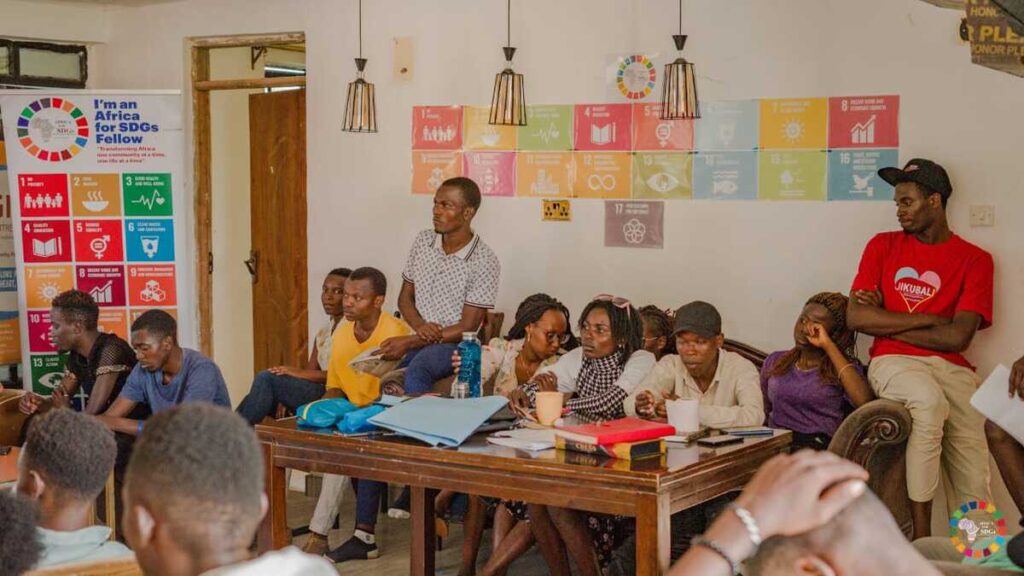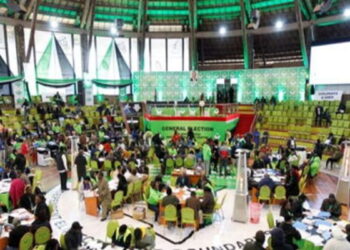A groundbreaking training programme on youth governance and civic participation has sparked new hope for democratic engagement in Western Kenya. The event, held at the Homa Bay Africa For SDGs Hub, brought together student leaders from multiple universities in the region.
The initiative, dubbed ‘Uwazi Uongozini’ (Awareness in Leadership), saw participation from Rongo University, Tom Mboya University, Kisii National Polytechnic, and Kisii University. The Ministry of Youth from Denmark, in collaboration with Uraia, supported the transformative gathering.

Image of students during training.
Africa For SDGs, the organisation behind this initiative, has established itself as a leading force in sustainable development across the continent. Founded with the vision of localising the United Nations Sustainable Development Goals, the organisation operates through a network of hubs across Africa, with the Homa Bay Centre serving as a key training facility in Western Kenya.
Dr Joe Bonga, CEO of Africa For SDGs, led the intensive training sessions focused on empowering youth to become active citizens and community advocates. “Today’s youth are tomorrow’s leaders. We must equip them with the tools and knowledge to participate effectively in governance,” Dr Bonga emphasised during his keynote address. Under his leadership, Africa For SDGs has trained over 5,000 young leaders across East Africa in the past three years.

Dr Joe Bonga, CEO Africa For SDGs and Ms Beatrice Khalivitsi, a senior trainer with Africa For SDGs
The organisation’s approach combines grassroots activism with high-level policy engagement. Through its various programmes, Africa For SDGs bridges the gap between local communities and national decision-makers, ensuring youth voices are heard in policy discussions.
Ms Beatrice Khalivitsi, a senior trainer with Africa For SDGs, conducted hands-on sessions that transformed theoretical concepts into practical skills. “Our approach combines classroom learning with real-world applications. We want these young leaders to return to their institutions as capable agents of change,” she explained. The training covered crucial aspects of governance, including budget accountability, transparent leadership, and community advocacy.
The Homa Bay Africa For SDGs Hub, where the training took place, represents the organisation’s commitment to sustainable development. The facility serves as both a training centre and a model for environmental sustainability, featuring solar power systems and water harvesting technologies.
The programme placed special emphasis on youth participation, policies, advocacy and sustainability. “Understanding advocacy processes is crucial for meaningful civic participation,” noted a student from Kisii University.
Africa For SDGs has developed a comprehensive curriculum that aligns with international best practices while remaining relevant to local contexts. The organisation maintains partnerships with various UN agencies and international development organisations, bringing global expertise to local training programmes.
Representatives from the Danish Ministry of Youth shared international best practices in youth governance, offering participants a global perspective on civic engagement. This international collaboration exemplifies Africa For SDGs’ approach to building global partnerships for local impact.
The organisation has announced plans to establish a network of trained youth advocates across Western Kenya. This initiative builds on Africa For SDGs’ existing network of alumni, who continue to drive change in their communities long after completing their training.
“Our vision extends beyond this four-day event,” Dr Bonga explained. “We’re building a movement of informed, engaged young citizens who will champion good governance in their communities.” The organisation provides ongoing mentorship and support to its trainees, helping them implement community projects and advocacy initiatives.
Africa For SDGs’ impact extends beyond governance training. The organisation runs parallel programmes focusing on climate action, gender equality, and economic empowerment, all aligned with the UN’s Sustainable Development Goals. Their integrated approach ensures that youth leaders understand the interconnected nature of development challenges.
Looking ahead, Africa For SDGs plans to expand its training programme to other regions, creating a nationwide network of youth governance champions. The organisation will provide ongoing support to participants as they implement their action plans, including access to small grants and technical assistance.
The success of the Homa Bay training has set a new standard for youth engagement in governance. It demonstrates Africa For SDGs’ growing influence in nurturing a new generation of leaders who understand the importance of transparency, accountability, and active citizenship.



















